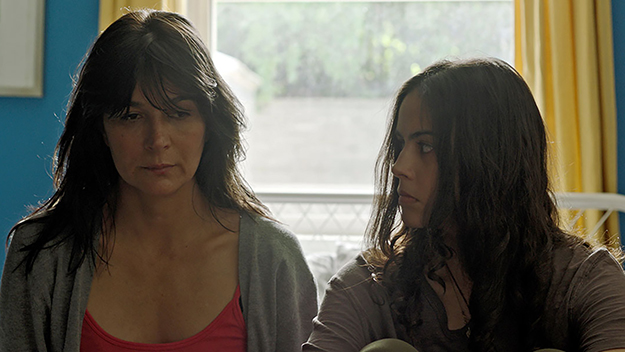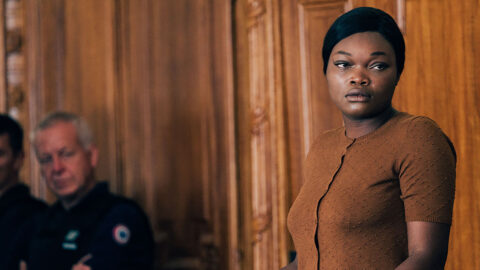TIFF 2022: Parent Trap
This article appeared in the September 22, 2022 edition of The Film Comment Letter, our free weekly newsletter featuring original film criticism and writing. Sign up for the Letter here.

Beneath the hoopla, the glamour, and the belated in-person reunions among filmmakers, curators, and critics, there was an eeriness to this year’s Toronto International Film Festival that counterweighted all attempts at projecting an air of business as usual. Each public gathering was a potential COVID-19 bath, and indeed, as the world’s largest public film festival progressed, certain faces, masked or unmasked, would suddenly disappear from the scene as colleagues fell ill and hid away in homes or hotel rooms. This is not a critique of the organizers—it’s simply a report from where we are at this point in the pandemic, a point where phantoms of festivals past seem to haunt our still-precarious present.
The everyday phantasmagoria was very much on my mind as I surveyed my list of festival favorites, at the top of which is the only film I watched twice. Fresh from its Venice premiere, Joanna Hogg’s The Eternal Daughter apprehended the spookiness and poignancy of our shared moment with its notably skeletal primary cast of three, isolated location, and focus on memory as an animating force. This exquisitely rendered film is at once a departure and a continuation for Hogg, in that it heartily embraces the tenets of the Victorian ghost story while sewing the same autofictional thread realized in the director’s recent pair of memory boxes, The Souvenir and The Souvenir Part II. As with those works, The Eternal Daughter follows a filmmaker named Julie—albeit a significantly older Julie than that of The Souvenir—as she travels with her mother to an old Welsh hotel enveloped by woods, whistling winds, and seemingly endless fog. The hotel was once a home inhabited by the mother’s family, and it brims with memories both happy and mournful, all of which Julie hopes to mine for inspiration in her nascent project, a film that—you guessed it—has to do with Julie’s relationship to her mother.
Both Julie and her mother are embodied by Hogg veteran and art-film titan Tilda Swinton, a casting coup that is entirely devoid of showiness. Rather, Swinton’s elegant dual performance speaks to the mirroring effect of an adult child who is desperate to connect with an aging parent through questions about the past, memory-triggering gifts, and general fussing, yet is repeatedly—and often amusingly—thwarted by reflexive codependencies that push her to tears: in a film swirling with mysteries, there is no greater enigma than the mother to the daughter. The production is genuinely spooky (things really do go bump in the night), often funny, gorgeously sound-designed and photographed on 35mm, and piercingly resonant to anyone with an older parent. What’s more, Swinton’s marvelous acting is complemented by that of Carly-Sophia Davies as a delightfully grouchy concierge and Joseph Mydell as the building’s kindly caretaker, a widower who, like Julie and her mother, is both repelled by and drawn to places freighted with history.
The anxieties particular to mother-child bonds are further heightened in Alice Diop’s Saint Omer, which won the Silver Lion in Venice. Loosely based on a real-life case, Diop’s first foray into fiction filmmaking after a series of bold documentaries follows Rama (Kayije Kagame), a novelist and academic developing a project concerned with the Medea myth. Rama travels from her Paris home to the titular French city to witness the trial of Senegalese-born Laurence Coly (Guslagie Malanda), a woman accused of killing her 15-month-old daughter by taking her to the sea and leaving her to drown in the rising tide. Rama herself is pregnant, and as the trial develops, she finds herself overwhelmed with memories of her own troubled relationship to her mother and a burgeoning fear regarding her own maternal capacities.
Early in the film, Rama shows her students a clip from Hiroshima mon amour and speaks about screenwriter Marguerite Duras’s sui generis methods of sublimating reality and trauma, as seen in the Resnais film’s oscillation between documentary footage and the contradiction-saturated dialogue between lovers. The reference initially seems to direct our attention to Diop’s repurposing of fact in fiction (Saint Omer draws heavily from courtroom transcripts of the actual case), yet by the time we arrive at the trial’s first session it has become clear that Duras’s inspiration extends to Saint Omer’s dazzling manipulation of cinematic form. The courtroom sequences are distinguished by mesmerizing shots of extended duration and exacting composition that frequently isolate individual figures. Special attention is paid to Coly, who maintains a transfixing composure during her testimony, while her shortness of breath and shifting posture hint at inward turmoil when listening to the testimonies of others. Like Duras, Diop uses verbal storytelling as incantation, circling questions of identity, intention, desire, and truth in a manner that feels charged with meaning, yet leaves crucial facts obscured.
Like Saint Omer, Lina Rodríguez’s third fiction feature, So Much Tenderness, which had its world premiere at TIFF, explores mother-child relationships from a distinctly immigrant perspective. The film focuses on Aurora (Noëlle Schönwald), a Colombian environmental lawyer who has relocated to Toronto following a devastating personal tragedy, and Lucía (Natalia Aranguren), Aurora’s daughter, who transitions from adolescence to adulthood in her new country. From its surprisingly thriller-like prologue to its scenes of ordinary activities punctured by unspoken loss, Rodríguez’s semi-improvised, behavior-rich approach and use of hyper-attentive long takes allow us to bear witness to the characters’ small epiphanies. As the film moves between depictions of housework, friends conversing about relationships, and romance (tellingly, Aurora dates a younger man, while Lucía seems drawn to older suitors), we feel the weight of time’s passage in the characters’ shifts in attitude or body language. Aranguren injects her role with enlivening agitation, and the entire cast rises to meet Rodríguez’s careful directorial provocations, but watch Schönwald, the actor Rodríguez’s cinema has been waiting for. As with Malanda’s pregnant silences in Saint Omer, the density of lived experience beneath Schönwald’s wordless presence is absolutely arresting.
TIFF 2022 seemed to be swimming with stories of challenged mothers, from Laura Poitras’s All the Beauty and the Bloodshed, a rousing portrait of Nan Goldin’s tumultuous childhood and exemplary integration of art and activism; to Bess Wohl’s less-convincing new-mother psychodrama, Baby Ruby; to Lila Neugebauer’s promising feature debut Causeway, co-scripted by novelist Ottessa Moshfegh, which finds Jennifer Lawrence’s brain-injured U.S. Army engineer forced to return to her less-than-ideal childhood home in New Orleans. (Causeway is, above all, a wonderful love letter to one of my favorite cities.) But this year’s festival also offered stirring stories about children and their fathers, such as Charlotte Wells’s gorgeous, gut-wrenching memory play Aftersun and Mia Hansen-Løve’s One Fine Morning, a story of an adult child coping with a patriarch succumbing to a degenerative disease—in my estimation, the director’s best work. Coyote, Katherine Jerkovic’s follow-up to her lauded debut feature, Roads in February, concerns a middle-aged Mexican immigrant (a deeply endearing Jorge Martinez Colorado) residing in Montreal who becomes entangled in his adult daughter’s struggle with addiction while trying to revive his culinary career. Though there’s something overly familiar about Coyote’s premise, Jerkovic displays a rare ability to locate moments of near-palpable interpersonal connection and life-altering decision-making within the simplest of encounters. As we continue to navigate a world where close contact is fraught, where what was once pandemic is now endemic, it’s that much more affecting to discover works of cinema that convey transformative experiences with the lightest touch.
José Teodoro is a critic, essayist, and playwright.







